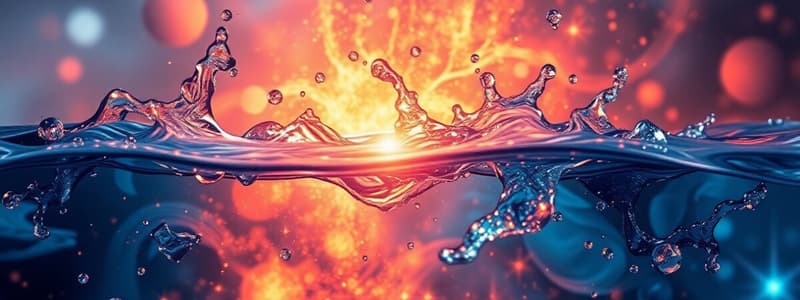Podcast
Questions and Answers
What do potassium and sodium produce when they react with cold water?
What do potassium and sodium produce when they react with cold water?
- Just hydrogen gas
- Only metal oxide
- Metal hydroxide and hydrogen gas (correct)
- Nothing at all
Which metal does not react with cold water but reacts with hot water?
Which metal does not react with cold water but reacts with hot water?
- Sodium
- Potassium
- Calcium
- Magnesium (correct)
How do metals like aluminum and iron react with steam?
How do metals like aluminum and iron react with steam?
- They produce hydrogen only
- They do not react at all
- They form metal oxides and hydrogen (correct)
- They produce metal hydroxides
Which of the following statements is true regarding the reactivity of metals with water?
Which of the following statements is true regarding the reactivity of metals with water?
What happens when calcium reacts with cold water?
What happens when calcium reacts with cold water?
Flashcards are hidden until you start studying
Study Notes
Reactions of Metals with Water
- Metals react with water to produce a metal oxide and hydrogen gas.
- Soluble metal oxides dissolve in water to form metal hydroxides.
- Not all metals will react with water.
- Potassium and sodium react violently with cold water, releasing heat energy.
- Calcium reacts less violently with cold water, producing heat, but not enough to ignite the hydrogen.
- Calcium floats because hydrogen gas bubbles stick to its surface.
- Magnesium does not react with cold water, but will react with hot water to form magnesium hydroxide and hydrogen gas.
- Magnesium also floats because hydrogen gas bubbles stick to its surface.
- Metals like potassium, sodium, and calcium react with cold water to form metal hydroxides and hydrogen gas, releasing heat energy.
- Magnesium reacts only with hot water, not cold water.
- Iron, aluminium, and zinc do not react with cold water, however they react with steam (hot water vapor) to form their respective oxides and hydrogen gas.
- The reactions of potassium, sodium, and calcium with cold water are exothermic reactions, meaning they release heat.
Reactions of Metals with Acids
- Metals react with acids to produce salt and hydrogen gas.
- The reactivity of metals with acids is determined by the metal's position in the reactivity series.
- Some metals like gold and platinum do not react with common acids.
- Metals that are more reactive than hydrogen will displace hydrogen from acids.
- Acids are corrosive substances that can cause burns.
Reactivity of Metals
- The Reactivity Series is a list of metals arranged in order of decreasing reactivity.
- Metals higher in the Reactivity Series are more reactive.
- The reactivity of metals increases as you go down the group and decreases as you go across the period in the periodic table.
- Potassium, sodium, calcium, magnesium, aluminum, zinc, iron, lead, and copper are examples of metals that show different degrees of reactivity.
- Metals react with different degrees of vigor depending on their positions on the periodic table, and the type of substance they interact with.
Studying That Suits You
Use AI to generate personalized quizzes and flashcards to suit your learning preferences.




